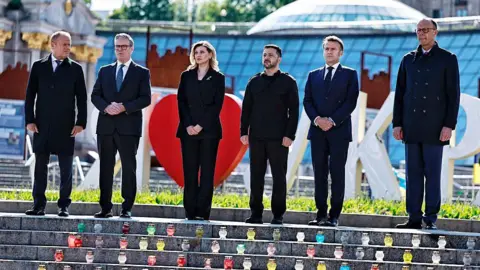In a significant diplomatic move, European leaders have united in a call for Russia to agree to an unconditional 30-day ceasefire with Ukraine, starting this coming Monday. This appeal was made during a pivotal meeting of what is being termed the “coalition of the willing” in Kyiv, where the leaders of France, Germany, Poland, and the United Kingdom convened with Ukraine’s President, Volodymyr Zelensky. Other leaders participated remotely, including Italy’s Prime Minister Giorgia Meloni and the President of the European Commission, Ursula von der Leyen.
The meeting in Kyiv signified a strong collective stance against Russian aggression and followed discussions with United States President Donald Trump, who initially proposed the ceasefire. The coalition’s leaders not only emphasized the need for a truce but also warned Russia of imposing “massive” sanctions if they fail to comply. UK Prime Minister, Sir Keir Starmer, articulated the coalition’s objective, stating that their aim is to demonstrate that “aggression will never prevail on our continent.”
Starmer elaborated further during the press briefing alongside President Zelensky, French President Emmanuel Macron, Polish Prime Minister Donald Tusk, and the German Chancellor, Friedrich Merz. He suggested that achieving a ceasefire will be critical for restoring Ukraine’s economy and instilling confidence in investors, while also facilitating the reunification of families distressed by ongoing conflict.
In his remarks, President Zelensky expressed gratitude for the unwavering support of European leaders, accentuating the focus on establishing lasting security measures for Ukraine. He dismissed any preconditions for a ceasefire proposed by Russia, suggesting that any demands would reflect an intention to prolong the conflict and undermine diplomatic efforts.
French President Emmanuel Macron stated the need for significant oversight of the impending ceasefire, suggesting that the United States would primarily monitor it with assistance from European nations. He reinforced that should there be any violations of the ceasefire, “massive sanctions would be prepared and coordinated” in tandem with European and American partners. Chancellor Merz underscored the viewpoint that the war, which commenced with Russia’s extensive invasion in February 2022, constitutes a blatant act of aggression that breaches international law.
The gathering in Kyiv served as a proactive response to a parallel event in Moscow, where over 20 leaders had gathered to show support for President Vladimir Putin. Meanwhile, the temporary ceasefire proclaimed by Putin in honor of Russia’s Victory Day, which lasted roughly 30 hours, saw a reduction in hostilities; however, both sides accused one another of violating its terms.
Additionally, Trump reiterated his call for the unconditional ceasefire following his phone conversation with President Zelensky, emphasizing that failure to adhere to the ceasefire could lead to other sanctions from the United States and its allies. In response, Kremlin spokesperson Dmitry Peskov criticized the Europeans for contradictory statements, dismissing them as confrontational rather than oriented toward rebuilding relations. He further suggested that any attempts to pressure Russia would be futile.
Despite claims of temporary ceasefire, reports of continued Russian attacks in various Ukrainian regions have persisted. In the northern Sumy region, an elderly woman lost her life due to shelling, and properties have suffered destruction across the board. These incidents further highlight the complex and tumultuous situation on the ground as diplomatic efforts continue.
The coalition formed during this meeting has also been discussed concerning the potential arrangements for security guarantees related to any eventual peace agreements, including the possible deployment of troops to Ukraine. The international community is closely monitoring the situation as talks progress to ensure that a durable peace can be established in the region while safeguarding Ukraine’s sovereignty and territorial integrity.



